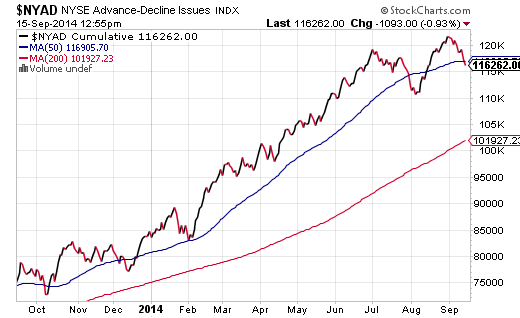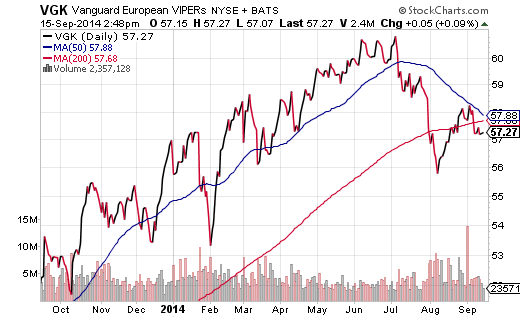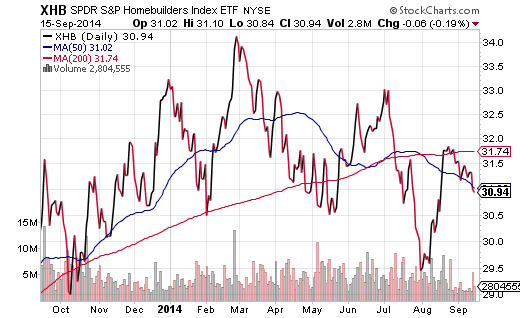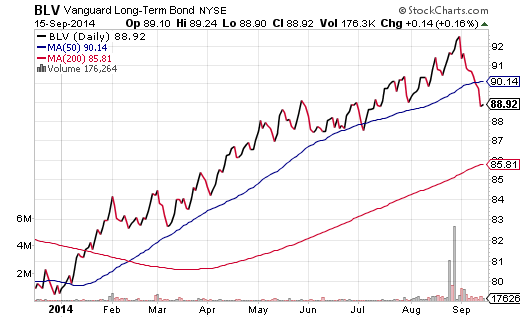The appetite for stock risk is softening, yet few people are talking about it. Take a look at the “Advance-Decline Line” – one of the more popular technical analysis tools for identifying potential trend reversals. It dropped below a short-term moving average (50 SMA) in early August; it is now below the key trendline in mid-September. More notably, the AD Line may be diverging from the S&P 500, as the latter is a mere 1.1% off of an all-time record high.

The evidence may or may not be particularly compelling. After all, the AD Line confirmed the broader bull market as recently as two week ago. On the other hand, Bloomberg reported that nearly one-half of all stocks in the NASDAQ Composite are down at least 20% from a 52-week peak; similarly, three-fifths of Russell 2000 companies have hit bearish 20%-plus declines. The uncertainty with riskier shares directly contrasts with the S&P 500. Bloomberg data confirm that a mere 6% of constituents are currently dealing with bear market downturns.
Is it possible that investors are beginning to worry that a 10% correction is rapidly approaching? Possibly. After three years without corrective activity, some folks may be shunning the shares of corporations that tend to suffer the most in downdrafts.
Granted, market participants have come to believe that central banks will continue boosting financial prices and squashing volatility through a combination of conventional and unconventional policy measures. What’s more, corporations have deployed balance sheet dollars to repurchase stock shares. Nevertheless, global economic weakness as well as geopolitical conflict cannot be ignored indefinitely.
In May, the Organization for Economic Cooperation and Development (OECD) projected 2014 and 2015 expansion for the euro zone at 1.2% and 1.7% respectively. Today, they predict 0.8% for 2014 and 1.1% for 2015. The OECD downgraded growth projections for the U.S. and Japan as well. Keep in mind that these economic downgrades have come in spite of massive central bank (e.g., Federal Reserve, European Monetary Union, Bank of Japan, etc.) intervention.
Shouldn’t slower growth in Europe drag on the revenue and earnings of U.S.-based multinationals? One would think so. However, the European Central Bank (ECB) will eventually engage in the same type of money-creating, bond-buying policies that the U.S. and Japan have been promoting for years. (That is what the credit agency Standard & Poor’s anticipates.) Expectations notwithstanding, it would be difficult to advocate an increase in one’s allocation to unhedged European stock ETFs until the ECB serves up greater clarity.

If the global economy is weakening – if the weakness is likely to drag on U.S. corporations – then what is the justification for buying more U.S. stock? Some claim you should buy U.S. stock because of a strengthening domestic economy. Yet the housing market is actually struggling, with homebuilders in the SPDR S&P HomeBuilders (NYSE:XHB) unable to capitalize on 2014’s declining interest rates. Labor force participation and inflation-adjusted wages have also failed to pick up.

So again, why buy stock? The reason that many will buy U.S. stocks with additional cash resources is the same reason that U.S. corporations have been buying back their own shares with corporate debt. Specifically, most remain confident in the Fed’s ability to restrain, contain and manipulate lending rates. Additionally, rising rate fears are overblown. Members of the Fed do not wish to rock the rate boat at a time when the global financial system is noticeably fragile.
In essence, if you have accepted the premise that “stocks are the place to be” in a low rate environment, you might as well stick to your premise. Rates are lower than they were at the start of 2014, and they are extremely likely to remain subdued.
Of course, it may be more intriguing to investigate what the current bond dip has to offer. Investors with cash – either from sidelined dollars or from portfolio trimmings – should look at the opportunities on the long end of the bond curve. Not only did the U.S. Treasury experience significantly higher-than-average demand at its most recent 30-year bond auction, but long-dated maturities yield significantly more than comparable European sovereign debt. The 30-year German bund? Roughly 2%. The 30-year U.S. Treasury? About 3.3%.
Few supported my “bonds-are-going-to-beautiful” thesis at the start of the year – that interest rates would fall, not rise, in 2014. Yet those who recognized the potential in funds like Vanguard Long-Term Bond (ARCA:BLV) and Vanguard Extended Duration (NYSE:EDV) have better year-to-date gains in the bond portion of their overall portfolio than the diversified stock portion.

Before and after chairwoman Yellen speaks this week, you may see bond prices fall (and yields climb) yet again. Still, you should be a net buyer of the Fed Reserve’s monetary policy news, as the attractiveness of long bonds will not dissipate anytime soon. They’ll still be attractive relative to sovereign debt around the globe. They’ll still be viewed as a safer haven against escalating geopolitical risk. And long maturity bonds tend to rise in a corrective stock phase – an event that has a high probability of occurring in the remaining months of 2014.
Disclosure: Gary Gordon, MS, CFP is the president of Pacific Park Financial, Inc., a Registered Investment Adviser with the SEC. Gary Gordon, Pacific Park Financial, Inc, and/or its clients may hold positions in the ETFs, mutual funds, and/or any investment asset mentioned above. The commentary does not constitute individualized investment advice. The opinions offered herein are not personalized recommendations to buy, sell or hold securities. At times, issuers of exchange-traded products compensate Pacific Park Financial, Inc. or its subsidiaries for advertising at the ETF Expert web site. ETF Expert content is created independently of any advertising relationships.
